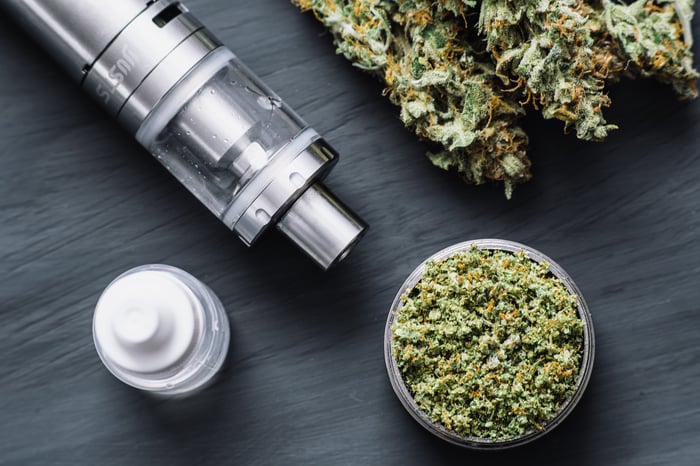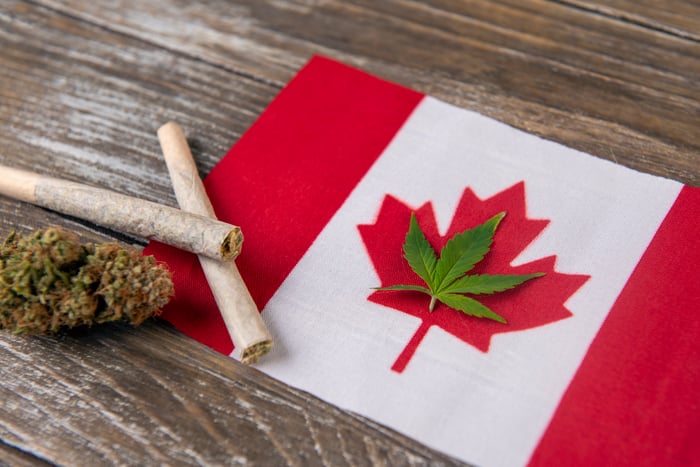Last year, Wall Street and investors witnessed history being made many times over. In the U.S., we observed additional states legalize medical marijuana, pushing the total number of states to have given the green light to cannabis in some capacity to 33, and saw the Food and Drug Administration approve the very first cannabis-derived drug. Meanwhile, Canada became the first industrialized country in the world to approve the sale of recreational weed in October.
But there's plenty of history yet to be made, with the next game-changing cannabis launch due later this year in Canada. Ladies and gentlemen, say hello to marijuana legalization 2.0.

Image source: Getty Images.
"Rec. 2.0" is coming: Here's what you need to know
On Oct. 17, 2018, Canada officially launched the recreational sale of cannabis throughout the country. However, when the green flag waved it wasn't an all-encompassing legalization. Only dried cannabis flower, cannabis oil, and sublingual sprays were allowed for sale, with popular derivatives, such as edibles, infused beverages, topicals, concentrates, and vapes, not yet legal. But that's soon to change.
According to updates from regulatory agency Health Canada, these derivatives, which are especially popular among the younger generation of marijuana users, will officially go on sale in licensed dispensaries by mid-December, with the laws governing derivatives going into effect on the one-year anniversary of recreational legalization (Oct. 17, 2019). This launch of alternative consumption products is what's being known as "legalization 2.0" or "Rec 2.0."
The reason marijuana businesses are so excited about legalization 2.0 is twofold. First, as noted, it offers a more intriguing way to reach a younger generation of consumers, as well as reach out to folks who might not otherwise try cannabis products. For instance, cannabidiol (CBD), the nonpsychoactive cannabinoid best known for its perceived medical benefits, has become especially popular, and is almost always sought after in derivative products.
Second, but most important, derivative products come with significantly higher margins than dried marijuana flower, which has been shown to be prone to commoditization and oversupply, at least in select U.S. states that legalized recreational cannabis years ago. For many Canadian pot stocks, sales and margins aren't really expected to soar until Rec. 2.0 occurs and abundant quantities of derivatives begin hitting licensed cannabis stores.

Image source: Getty Images.
This is industry-wide, not company-specific
What's important to realize about legalization 2.0 is that this isn't a company-specific event. It's not as if one company is leveraged to the hilt on derivatives while others are barely committing to alternative consumption options. This is a growth catalyst that every single marijuana stock is counting on over the near, intermediate, and long terms.
For instance, Cronos Group (CRON -0.82%) is likely to be more reliant on derivatives than any other billion-dollar Canadian grower. Cronos Group may not be in the top 10 in terms of aggregate production, but it aims to be a major cannabinoid producer and vape-market player. Cronos will pay up to $100 million to Ginkgo Bioworks for access to its microorganism development platform that'll produce yeast strains capable of targeted cannabinoid production at commercial scale. It's also working hand in hand with Altria, which owns a 45% equity stake in Cronos Group, to develop products for the vape market. Vapes are expected to be the most popular derivative product, followed by edibles.
Atlantic-based OrganiGram Holdings (OGI -2.66%) is also strongly focused on the derivatives market, even though nearly all of its sales have been devoted to the recreational side of the equation (medical patients are more likely to buy cannabis derivatives). OrganiGram has invested in fully automated production equipment for infused edibles, is refurbishing 56,000 square feet of space at its Moncton facility in New Brunswick for added extraction capacity, and developed a nano-emulsion technology to provide a quicker onset of cannabinoids. OrganiGram will introduce its proprietary nano-emulsion technology as a dried powder first, but is actively seeking out a beverage partner that'll feature this technology.
Even smaller players are getting in on Rec. 2.0. For example, The Supreme Cannabis Company (SPRWF) recently announced the acquisitions of Truverra and Blissco. Truverra will manufacture derivative products for Supreme Cannabis and service the company's international medical demand, with Blissco providing CBD- and tetrahydrocannabinol (THC)-based wellness products and pre-rolls. Supreme Cannabis was also one of four cannabis growers (along with OrganiGram) chosen by vape giant PAX Labs to supply it with extracts, resins, and distillates for the PAX Era vaping device.

Image source: Getty Images.
A concern to keep in the back of your mind
There's no denying the importance of legalization 2.0 for cannabis stocks. Without the ability to sell higher-margin products, it would be increasingly difficult for pot stocks to differentiate themselves and grow their bottom lines.
However, there's a concern that investors need to be aware of, namely that the launch of derivatives will be subject to the same supply problems that have plagued dried cannabis flower to date.
As you might be aware, regulatory agency Health Canada has been buried under cultivation, processing, and sales license applications. It began the year with more than 800 applications to review, yet had approved fewer than 200 applications since 2013 as of mid-July. Even with newly implemented regulatory changes, it could take the agency numerous quarters to work through its cultivation, processing, and sales license backlog. That means supply challenges are very likely for derivative products when they first hit licensed stores.
If you've bought into cannabis stocks for the long haul -- which is absolutely the way to play this burgeoning industry -- then near-term supply issues aren't that big of a deal. But if you expect to get rich quick with weed stocks, then you're probably going to be sorely disappointed.





